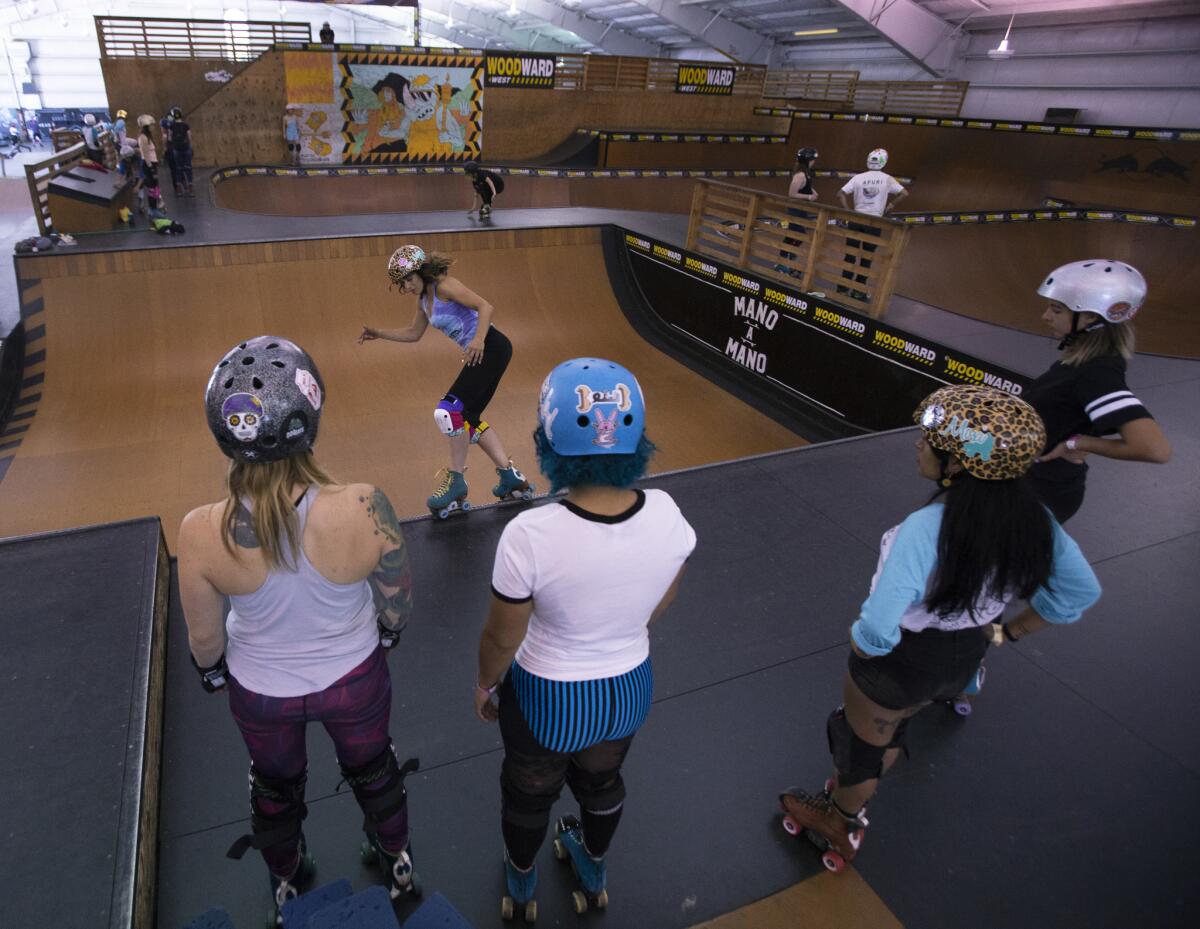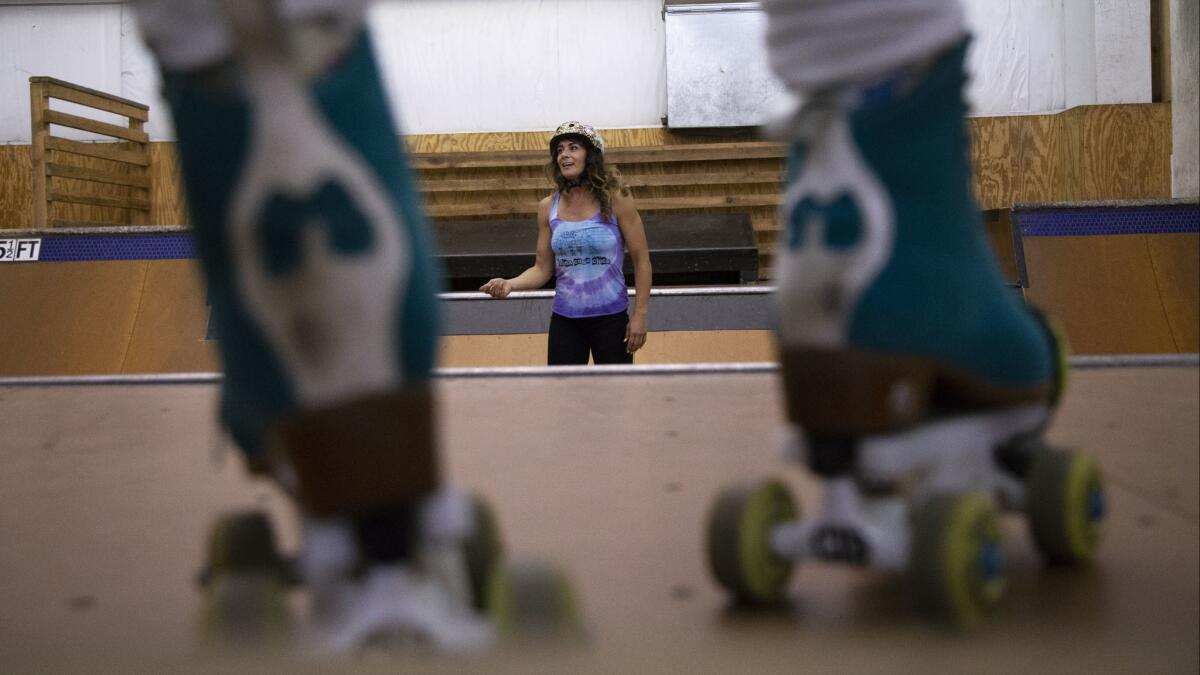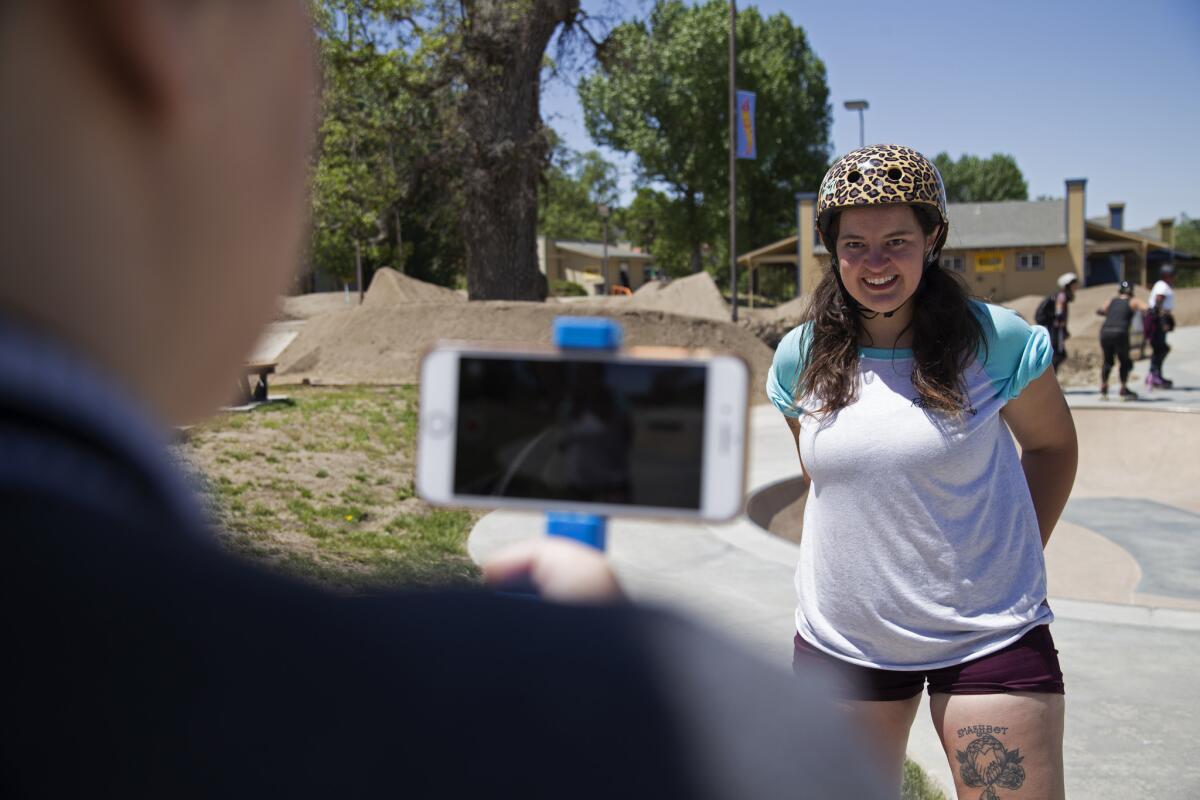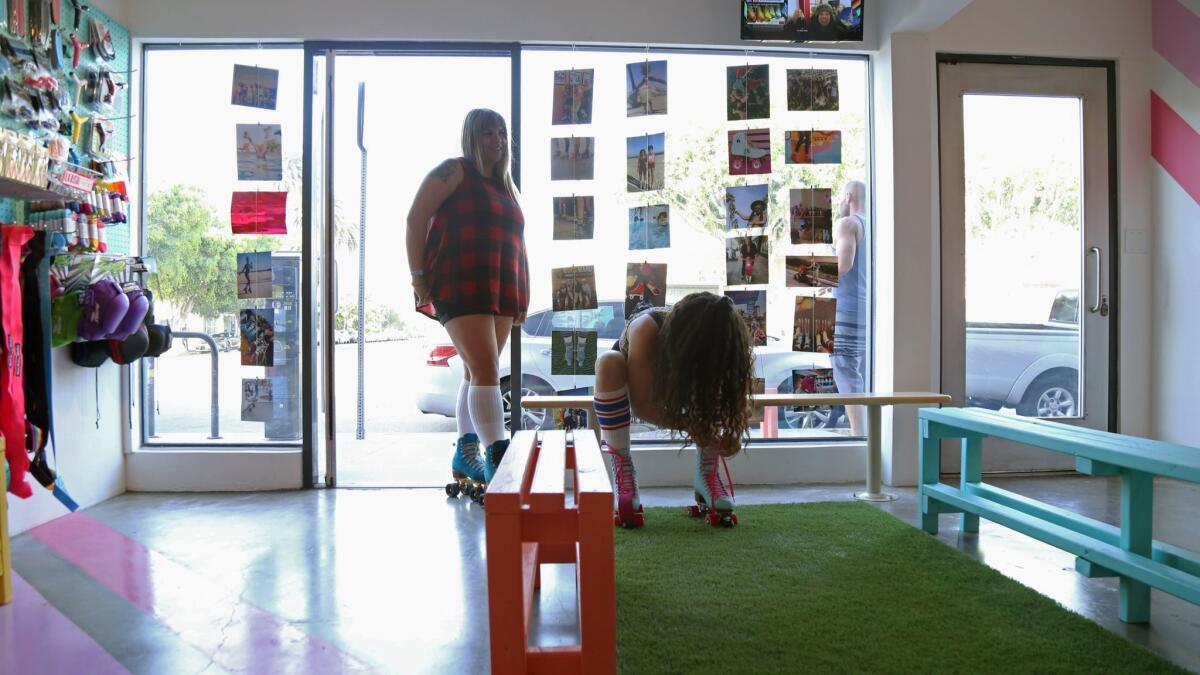How Moxi used nostalgia for L.A.’s skate culture to roll into the mainstream

Michelle Steilen, also known as Estro Jen, was inspired by her simultaneous love of roller skating and her distaste for ugly roller derby skates. So she created her roller skate company, Moxi.
The women of the Moxi skate team whiz through the streets of Long Beach on their roller skates, first gliding in serpentine patterns, then performing back flips, midair splits and handstands off skateboard ramps.
These moves, as seen in YouTube videos that have netted tens of thousands of views, helped push the Moxi brand mainstream. Today, the Long Beach company’s customers include experienced skaters as well as fashion-forward newbies attracted to the whimsically colored, retro high-top skates.
Fueled by a hot market for nostalgia and savvy social media marketing, Moxi has built on Southern California’s rich history of roller skating to tap the fashion and fitness industries. The brand has grown from its start in 2010 to sell more than 10,000 pairs of skates last year. In fiscal year 2018, Moxi accounted for 20% of the roller skate revenue reaped by its manufacturer and brand partner, storied skate maker Riedell Shoes Inc. Riedell declined to provide annual sales totals for the brand.
“I really see it as a practical thing that Americans need,” said Michelle Steilen, 35, creator and founder of Moxi. “I wanted to create a brand that brought roller skating back to everyone.”
In Los Angeles, roller skating evokes memories of the 1980s, when skating along the beach was immortalized in Randy Newman’s “I Love L.A.” music video, and indoor roller rinks like Compton’s Skateland helped give rise to hip-hop in L.A. Across the country, celebrities like Janet Jackson could be seen on television, skating at indoor roller rinks during the disco craze.

Steilen first learned to roller-skate as a child growing up in Bucks County, Pa., just northeast of Philadelphia. Her dream was to own a pair of completely pink skates, but that color wasn’t an option — roller skates were sold only in white, black and tan up until about the late 1970s.
After graduating from Temple University in 2005 with a degree in psychology, Steilen decided to take some time to figure out what she wanted to do for a career. She bought a one-way ticket to California, where her then-boyfriend had gotten a temporary job building ramps for the X Games.
Right before she left, she saw a team then known as the Philly Roller Girls featured on the cover of alternative newspaper Philadelphia Weekly and was intrigued. When she got to Los Angeles, she joined the L.A. Derby Dolls, adopted the skate name “Estro Jen” and fell in love with the sport.
But roller derby is physically demanding and a major time commitment, which limits widespread participation. That sparked an idea to make roller skating more accessible. She wrote to skate manufacturers, including Riedell, and pitched a line of skates that would appeal to people — especially women — of all athletic abilities and ages.
“What better way than to make them fashionable?” Steilen said. “You can’t just be a roller derby player your whole life, but you can roller-skate into your 90s.”

Riedell has made both roller and ice skates in Red Wing, Minn., since its start in 1945, but the company is more known for its work with Olympic figure skating medalists Michelle Kwan and Scott Hamilton.
Sales were historically split 50/50 between the two sports, but the growth of women’s flat-track roller derby in the early 2000s pushed roller skate sales above their cold rink counterparts. Today, Riedell’s sales skew toward roller skates in a ratio of about 60/40, said Bob Riegelman, president and chief executive of Riedell.
Riedell asked Steilen to prove there was a market for high-top skates that appealed to new skaters. So she opened a store in Long Beach in 2008 and sold black and white skates as part of a $150 “Farrah Fawcett” package that included colorful wheels, laces, pom-poms and free summer skating lessons.

Demand exceeded the physical confines of the store and by 2010, Riedell was manufacturing pink, purple and teal high-top suede roller skates under the Moxi brand name. The skates sell for $279 and are called “Lolly” after Steilen’s sister, Loren, an administrative manager for the Moxi brand.
The next year, Moxi inked a six-month exclusive deal to sell skates at Urban Outfitters. The line was alternatively categorized under footwear, novelties, housewares and accessories.
“It’s the only brand I know within the entire skating industry … that really touches on the fashion, lifestyle and much broader market,” said Zach Kulak, brand manager at Riedell. “I don’t think Urban Outfitters would be caught for a second looking at skates from any other brand. Moxi fits that fashion-forward, very stylized product they’re looking for.”
Urban Outfitters did not respond to a request for comment. But Matt Powell, sports industry analyst at market research firm NPD Group, said roller skating fits into the type of non-traditional, social fitness activities frequently sought by younger consumers.
Though NPD Group does not track activity, “there is no question that the millennial consumer — male and female — is much more interested in health and fitness today,” he said.
Steilen describes roller skating as the “loophole to exercise.”
“It doesn’t need to be serious,” she said. “It doesn’t have to be in a sports arena to be enjoyed.”
It also doesn’t hurt that California, and the West Coast, is a strong market for roller skating. Los Angeles, in particular, became known for outdoor roller skating along Venice Beach. Skateland — known for hosting N.W.A.’s first show — was one of two indoor roller rinks that played pivotal roles in the growth of hip-hop in L.A.
“Skating is very much a collective activity,” said Oliver Wang, a professor of sociology at Cal State Long Beach, who wrote an article in 2013 for KCET about the appeal of Glendale’s Moonlight Rollerway rink. “It requires some degree of skill, but it’s also easy to get into as a beginner.”

Those beginners, especially between the ages of 15 and 35, make up a core customer base for Moxi, said Shayna Meikle, 32, owner of the Moxi shop in Long Beach and its newly opened sister store in Venice.
In addition to the Lolly, Moxi offers a cheaper skate with a vinyl boot called the Beach Bunny, which debuted late last year and is made overseas. The Lolly is manufactured in Minnesota. Moxi has also expanded into accessories such as hats and shirts.
On a recent Thursday, two customers called the Long Beach store within five minutes of its opening, inquiring about specific skate availability. Meikle, who has played roller derby for more than 10 years and goes by her skate name “Pigeon,” said the brightly colored store along Retro Row gets about 7,200 customers a year. Part of the brick-and-mortar location’s appeal is allowing customers to try on skates, learn how to maintain them and build connections with other skaters, she said.
“E-commerce does not support a community,” Meikle said.
The brand’s strong social media presence also draws customers. Kulak of Riedell said Steilen’s Instagram account, which has 77,000 followers, is a “huge driver of the movement.” Other skaters on the largely female Moxi-sponsored skate team, including Meikle, have large followings.
A customer from South L.A. recognized Meikle at the store from YouTube videos and eagerly asked to take a selfie with her. After purchasing suede Lolly skates with pink and teal wheels, the young woman mentioned that her boyfriend had asked if she would soon be jumping off ramps and performing tricks, like the other Moxi skaters.
“I like that you guys are about women’s empowerment,” the customer said to a store employee. “I’m about that, too.”
Twitter: @smasunaga
Inside the business of entertainment
The Wide Shot brings you news, analysis and insights on everything from streaming wars to production — and what it all means for the future.
You may occasionally receive promotional content from the Los Angeles Times.








